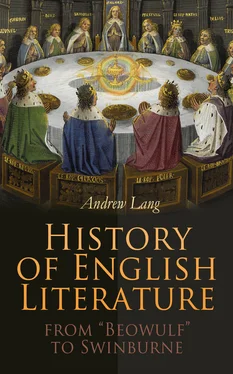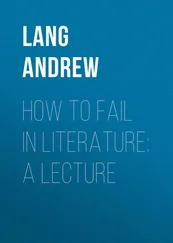Happily for his readers, William is not above telling anecdotes like the romance of the statue at Rome, with an inscription on the head, "Strike here". How this was misunderstood, how at last a wise man marked the place where the shadow of the fore-finger of the statue fell at noon, and what wonderful adventures followed when men dug there, and found a golden palace lighted up by a blazing carbuncle stone, is narrated in a captivating way, but is not scientific history. (Bk. II, Ch. X.) William mingles real letters and other documents with miracles and ghost stories: indeed, he is determined to amuse as well as to instruct, and he succeeds. In describing the enthusiasm stirred by the preaching of the First Crusade, he falls into the very manner of Macaulay. "The Welshman left his hunting, the Scot his fellowship with lice, the Dane his drinking-party, the Norwegian his raw fish."
Certainly William was not a wholly scientific historian. He is never uninteresting. If he finds any set of events tedious, he says so plainly, and passes onwards. He is very fair, is learned in the manner of his age, and his love of digressions and good stories reminds us of the Greek Herodotus, "the Father of History," and the most entertaining of historians.
Among the names of other Latin chroniclers is that of Henry of Huntingdon (writing in 1125-1154). The author of the "Deeds of King Stephen" is unknown: the work of William of Newburgh in the reigns of Henry II and Richard Cœur de Lion, is well remembered for his attack on the "lies" of Geoffrey of Monmouth. The assault on Geoffrey's truthfulness was not so superfluous as it seems, because his romance won the belief of many generations.
Richard Fitz Neale, who was Treasurer of England and for nine years Bishop of London (1189-1198), wrote the Dialogue "De Scaccario," "concerning the Exchequer," which is still studied as the best authority on mediaeval national finance in England, and on our early constitutional history.
Jocelin de Brakelond left a "Chronicle" (1173-1202) much concerned with life in his own monastery at St. Edmundsbury, and with the wise rule of Abbot Sampson. This book forms the text on which Carlyle preaches in his "Past and Present": it proves sufficiently that the monks were not the lazy drones of popular tradition and abounds in vivid pictures of men and of society.
Gerald of Wales (Girald de Barri, called Cambrensis, "the Welshman," 1147-1217?) was of royal Welsh and noble Norman birth, his family, the de Barris, were among the foremost Norman knights who took part in the invasion (it can hardly be called the conquest) of Ireland, under Strongbow; and he himself was a great fighter in the disputes of churchmen. There was not much schooling to be had in wild Wales, then very rebellious, but he probably learned Latin from the chaplains of his uncle, a Bishop, before he went to the University of Paris, to study law and science. Gerald was more like a modern literary man than a mediaeval chronicler. He never ceased from travelling, now following the Court, now rushing to Paris, now to Rome. When Archdeacon of St. David's, which the Welsh wanted to make a Canterbury of their own, with their own Archbishop, he stood up against the Bishop of St. Asaph; when the Bishop threatened to excommunicate him, he had bell, book, and candle ready to excommunicate the Bishop, whom he frightened away.
But Henry II would not permit Gerald to be Bishop of St. David's, thinking him certain to stand up for Wales against England. In 1184, Gerald went to Ireland with Henry's son, Prince John, who cannot be better described, as an insolent ribald young man, than he is in Scott's "Ivanhoe".
Gerald wrote a "Topography of Ireland," which is really "A Little Tour in Ireland". His chapters on the "Marvels of Ireland" lead us to suppose that the natives hoaxed him with strange stories, for example the tale of a church bell that wandered about the country of its own will: the innumerable fleas at St. Nannan's in Connaught is more credible, but the tale of the wolves who asked to receive the Holy Communion was not believed in England. One miracle was only a beautifully illuminated manuscript of the kind decorated by Irish artists 400 years earlier. The art had been lost, and the artist was supposed to have copied the designs of an angel.
Gerald found the Irish very ignorant, lazy, dirty, and ferocious. Every man used a battle-axe in place of a walking stick, and man-slayings were frequent. The Irish clergy were devout and chaste, but drank too much. On the wild beasts and birds of Ireland Gerald wrote like a naturalist and a sportsman, though he supposed that salmon, before leaping a fall, put their tails in their mouths, and letting go, fly upward by the spring thus obtained.
His "History of the Invasion of Ireland" is valuable, but he introduced, in the manner of some Greek and many Roman historians, long speeches which were never made. He also, after an energetic wandering life, always fighting to be made Bishop of St. David's, wrote his own autobiography, an amusing conceited book, full of adventures of travel. He wrote, too, on the natural history and the inhabitants of Wales, a book very valuable to this day. He died after reaching the age of 70.
Among his friends was a native of the Welsh border, Walter Map, Archdeacon of Oxford. "You write much, Master Gerald," said Map to him, "and you will write more; and I deliver many discourses. Your books are better than my speeches, and will be remembered longer; but I am much more popular, for you write in Latin, and I speak in the vulgar tongue," meaning French. Poor Gerald confesses that he made nothing by his books, and looked for his reward, not in vain, to the applause of future ages.
But Map has had his own share of praise, more than he should get, if, as he said, he wrote little. He was born about 1137, studied at Paris, was one of the king's judges who rode on circuit, and, in 1197, was made Archdeacon of Oxford. One book which he certainly wrote, "On Courtly Trifles" ("De Nugis Curialium," in Latin) is a collection of anecdotes clumsily told, and of reflections, with stories of the Welsh, historical jottings, folk-lore, tales, and attacks on the clergy of the Cistercian Order. As a judge he said that he was fair, except to Jews and Cistercians, "who did not deserve justice, for they gave none". Satirical Latin poems against Golias, a type of a noisy licentious Bishop, are also attributed to him. In the confession of this Bishop occur the famous lines, thus translated by Leigh Hunt,
I devise to end my days—in a tavern drinking;
May some Christian hold for me—the glass when I am shrinking;
That the Cherubim may cry—when they see me sinking,
God be merciful to a soul—of this gentleman's way of thinking.
The lines, in rhyming Latin, became a drinking catch, conceivably they were that before, and were merely put into the Bishop's mouth as a proof of his bad character. The word "Golias" as a nickname for a ribald "Philistine" priest was hundreds of years older than Map's time. A long romance in French, on Launcelot, the Holy Grail, and the death of Arthur, is attributed to Map in some manuscripts, and as a contemporary romancer says that Map "could lie as well as himself"—that is, like himself wrote romances of love and tournaments—he may possibly have been the author of "the great book in Latin which treats openly of the history of the Holy Grail". But no copy of that Latin book is known to exist, nor is it certain that it ever existed, while Map, as we know, said that he did not write much of any sort, especially not in Latin.
Changes Since the Conquest.
It is plain that, within a century from the battle of Hastings, new influences of many kinds were working in England, and changing the national character and intellect. There was the learning from Paris University, and from the Continent in general; there was the clearer intellect and energy of the Normans; the vivacity of such Welshmen or men from the Welsh marches as Geoffrey of Monmouth, Gerald, and Map. Anglo-Saxon literature had never been vivacious.
Читать дальше












